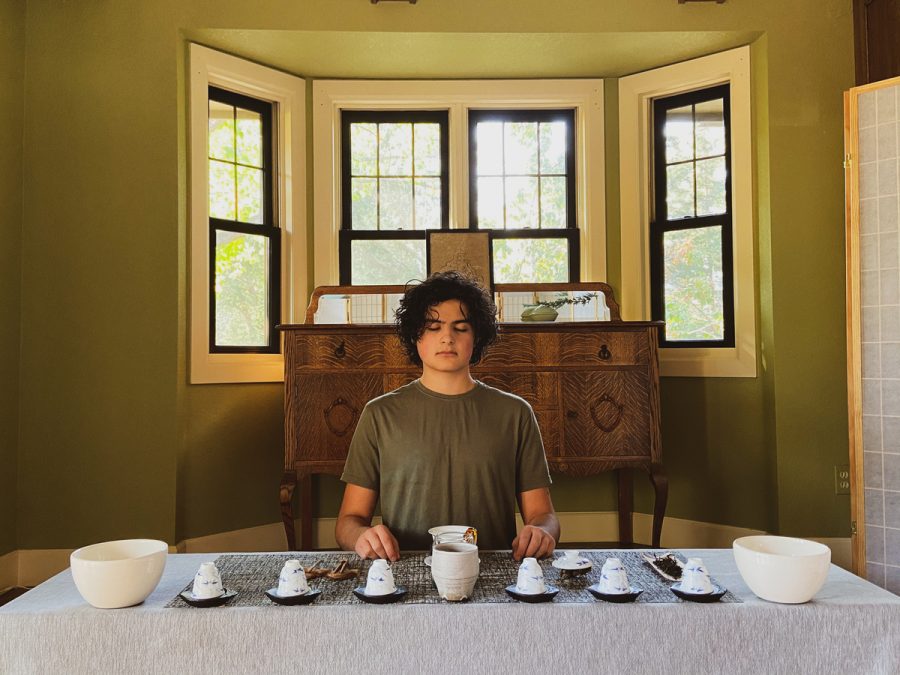Grady Clark: Tea Master in Training
Grady Clark sits silently as he waits for the water to boil.
A year before his summer exchange trip to China, Grady Clark wandered into the Trident Cafe and tried a tea from Yunnan, the region of China he was going to. He was enthralled by the complex flavors and aromas and continued to go back and try every single tea they had. He then got his own tea set and began making tea for himself.
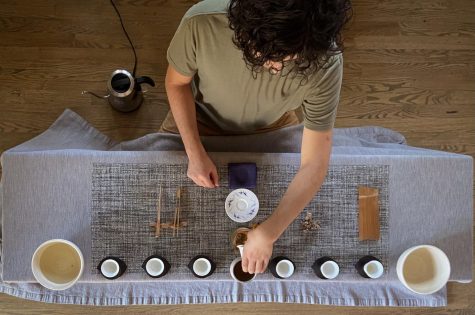
Grady’s trip abroad was through Where There Be Dragons, which features an independent study project, which Grady used to apply to study tea ceremony after becoming interested in it. Flash forward to summer 2019 and Grady was living in Yunnan, China, the birthplace of tea. Before his two-week tea study at the end of the trip, he visited tea shops frequently. Grady loved these tea shops, especially how “every tea shop has this big table in the back where the owner sits, and if you come in, they will make you sit down and start brewing you tea.” You’re not forced to buy this tea; it’s a place where people gather and try teas shared by the owners. He recalls once being alone in a tea shop with the owner, and through the Chinese, he knew he was able to understand that the owner said, “any lover of tea can find friends anywhere in the world.”
The pinnacle of his trip was two weeks spent studying tea ceremonies with a tea master. Every afternoon on weekdays, Grady would practice the art in a “gorgeous mountain house with a tea studio in an amazing garden.” On the first day, his tea master sat him and his translator down and simply made them tea. That first experience “felt like ASMR, every single noise and drip and clink gave me full-body chills.” Grady was inspired. These practices consisted of learning a traditional Chinese poem about tea and learning the form of Yi Gui tea ceremonies, the specific kind he was studying. His tea master was surprised and happy that Grady was a male interested in studying tea because that is not something she typically saw. Grady said that “in China, and especially with young men in China, there is no reverence for the traditional arts, such as tea ceremony, calligraphy, and ceramics making.” The two of them formed a deep bond, and at the end of their two weeks, his tea master asked if he would continue to be her student. With this newfound knowledge, Grady brought his tea practice back home. His mentorship continued in the US as Grady sends a video of his practice to his master in China every month and plans on returning to China someday.
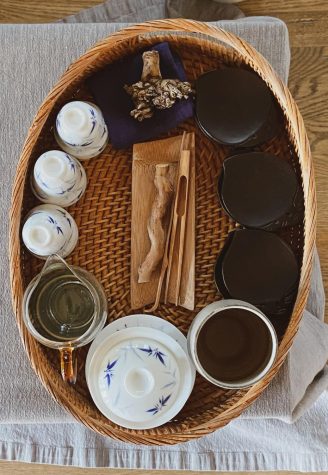
Conducting the tea ceremony is a long process that begins with a purification of the gathering space. Before every ceremony, Grady spends about an hour and a half participating in a thorough cleaning of every nook and cranny, trying to clear out every particle of dust in the area. He then goes out and brings back a bit of nature that he feels indicates the season. Then the guests arrive and the tea ceremony begins. When asked how he chooses the guests for each ceremony, Grady said that he “tries to get a very eclectic group of people together, people that are from different parts of his life.” In Grady’s belief, a tea’ ceremony’ is too formal a word to describe the event. He instead prefers to use the phrase ‘tea gathering,’ as it’s less about formalities and more about the gathering of his close friends and family. A tea ceremony is performance art, and so when conducting the ceremony, every movement should be controlled and graceful, similar to a dancer. Grady feels that this emphasis on grace helps him stay in the moment and helps his stresses go away; all his focus is his next movement, not the guests’ thoughts or whether or not he will mess up. For Grady, a tea ceremony encompasses a reconnection with nature. When interviewing Grady, he emphasized tea’s rebirth, saying that tea involves a reuniting of leaves and hot water, making the leaves come back to life and move nutrients through them again. In Grady’s own words, “drinking tea is not just drinking a beverage, it’s an accumulation of centuries-old trees, roots, soil, water, rain, rivers and sun that have fed their energy into the tea,” it’s a full cycle of life.
“Drinking tea by oneself is spiritual, two is divine, three and four is joyous, five and six is ceremonial, seven or more is excessive.” -Ancient Chinese Proverb
Before Grady discovered tea, he had struggled with meditation. Tea ceremonies have helped him focus, learn about himself and improve his mental health. Since becoming dedicated to the art of tea, he has brought more grace into his life. Moreover, Grady has learned to take things less seriously and connect to Taoist literature and philosophy. He wisely expressed his view that “everything is going the way it’s going, and there’s no reason to be afraid of that.”
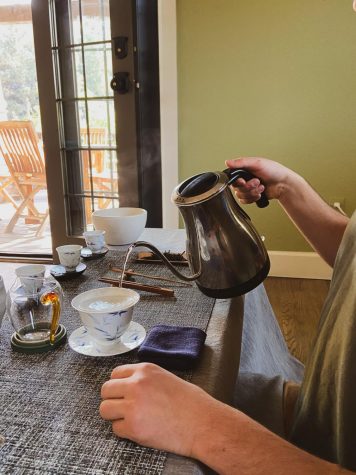
The tea ceremony has an almost magical effect on the people participating. It is said to be a conversation without words. When Grady serves tea, he is serving everything he feels towards his guests at that moment. The only time eye contact is made during the gathering is when Grady actually serves the tea; this is a bit of release within the ceremony and an unspoken connection between Grady and the guest. Grady keeps a tea journal and has his guests record their reactions and thoughts about the tea gathering. People often choose to remain silent as they don’t know what to say or enjoy the hour of silence in unanimous tea appreciation. Grady shared some of his favorite quotes from the journal: “drinking tea should take one back to the forest” and “I find it interesting how drinking the hot tea can be just as refreshing as cold lemonade.”
We have both been lucky enough to participate in a couple of Grady’s tea gatherings. These morning ceremonies were very memorable and interesting experiences for us. The overarching feeling of the gathering surrounded being present: you had nothing to focus on except what was happening at that moment. Grady preparing and making the tea to drinking it yourself is all a very calming experience. While the ceremony itself is especially meditative, you feel extra energized and content during the remainder of the day.
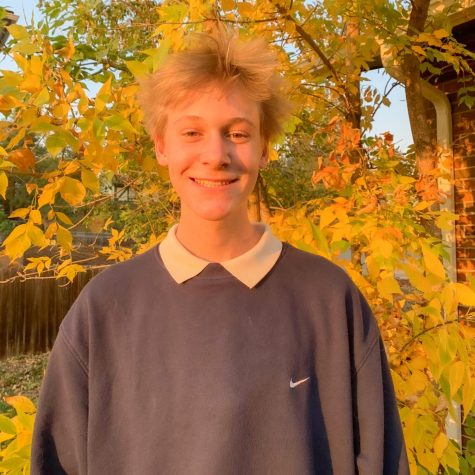
Miles Wright is a senior making his debut on the newspaper team. Miles enjoys running cross country, rock climbing, and backpacking all over Colorado and Wyoming. On the trail, his go-to snack is green grapes and a Yerba Mate. Miles can also be found fighting fervently in the courtroom, where he is part of the Mock Trial team. Miles is an enthusiast for all types of music but specifically jazz as he plays saxophone and piano in Boulder High’s Jazz Band. In The Owl, Miles hopes to benefit the Boulder community during this unprecedented time and write about movies, books, and interesting stories he comes across. He has enjoyed writing his entire life and is thrilled to improve his skills this...
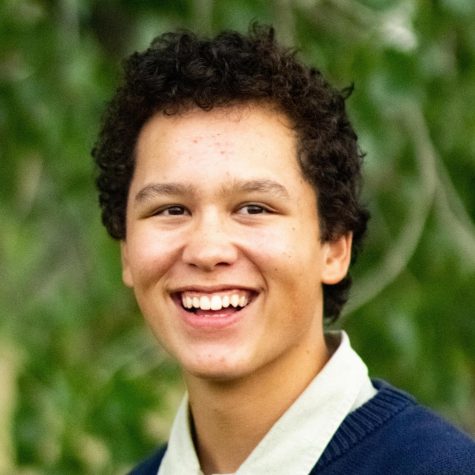
Cole Drozdek is a senior at Boulder High School. He is an avid climber and can often be found at The Spot Gym, where he has been on the team for the past decade. This past summer, Cole has found that his latest passion is bagging peaks with his buddies, although he is not a fan of waking up at 2 am. When he’s not climbing or hiking, Cole can be found perusing thrift stores or watching films with his friends. Cole’s passion for podcasts and movies led him to become a member of The Owl staff, and he hopes to further this passion for writing reviews and starting his very own podcast. Perhaps his first podcast episode will be dedicated to why green grapes are inherently better than purple grapes.


